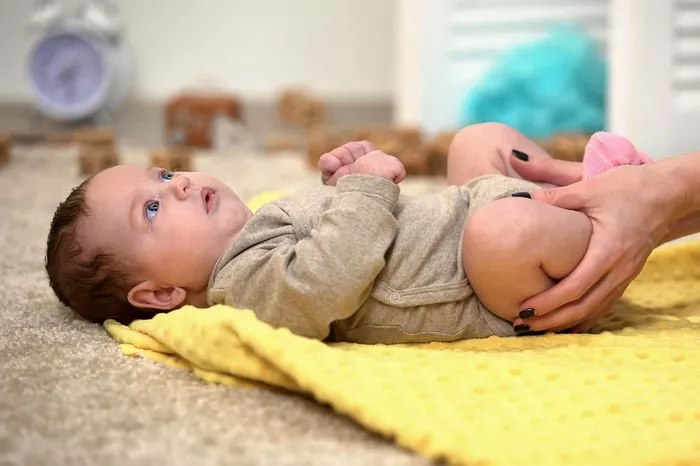Hiccups are a common occurrence in newborns. Parents often notice their baby hiccuping shortly after feeding or even during sleep. While it can be puzzling and sometimes a bit alarming, understanding why newborns hiccup can help alleviate concerns and provide reassurance.
What Are Hiccups?
Hiccups are involuntary contractions of the diaphragm, the muscle that separates the chest from the abdomen and plays a crucial role in breathing. These contractions are followed by a sudden closure of the vocal cords, which produces the characteristic “hic” sound.
In newborns, hiccups are typically harmless and a normal part of their development. They can happen at any time, but they are most commonly seen after feeding or during sleep.
Causes of Hiccups in Newborns
Several factors contribute to why newborns experience hiccups. Here are some common causes:
Feeding: One of the most common triggers for hiccups in newborns is feeding. Rapid feeding, overfeeding, or swallowing air during feeding can irritate the diaphragm and lead to hiccups. Newborns often swallow air along with milk, which can cause the diaphragm to contract.
Digestive System Immaturity: Newborns have an immature digestive system that is still adjusting to processing milk. This immaturity can lead to irregular contractions of the diaphragm and result in hiccups. As the digestive system matures, the frequency of hiccups generally decreases.
Temperature Changes: Sudden changes in temperature can sometimes trigger hiccups. For example, if a baby’s environment changes from warm to cool, or if they are exposed to cold air, it might induce hiccups.
Gastroesophageal Reflux (GER): Some newborns experience gastroesophageal reflux, where stomach contents flow back into the esophagus. This condition can cause irritation and lead to hiccups.
Excitement or Overstimulation: Newborns can also hiccup as a response to excitement or overstimulation. When a baby is overly stimulated or experiences a sudden burst of activity, their diaphragm may contract involuntarily.
Are Hiccups Harmful?
For most newborns, hiccups are harmless and do not cause any discomfort. Hiccups usually resolve on their own within a few minutes. They are a normal part of a baby’s development and are generally not a cause for concern.
However, if hiccups persist for long periods or are accompanied by other symptoms, it may be worth consulting a pediatrician. In rare cases, persistent hiccups could be a sign of an underlying medical condition that requires attention.
Managing and Reducing Hiccups
While hiccups are usually harmless, there are a few strategies that can help manage or reduce their occurrence:
Feeding Techniques: Ensuring that your baby feeds slowly and takes breaks during feeding can help reduce the amount of air swallowed. Burping your baby regularly during and after feedings can also help prevent hiccups.
Check for Overfeeding: Avoid overfeeding your baby, as excessive amounts of milk can increase the likelihood of hiccups. Following recommended feeding guidelines can help prevent this issue.
Temperature Control: Maintaining a comfortable and consistent temperature for your baby can help minimize hiccups related to temperature changes. Dress your baby appropriately for the environment and avoid exposing them to sudden temperature changes.
Manage Reflux: If your baby experiences reflux, try feeding them in an upright position and keeping them upright for a short period after feeding. Consult with your pediatrician for additional strategies to manage reflux.
Calm Stimulation: Reduce over-stimulation and provide a calm environment for your baby. If they are overly excited or agitated, offering a soothing environment can help prevent hiccups.
See also: What Is The Most Effective Treatment For Hiccups In Children
When to Seek Medical Advice
While hiccups are usually not a cause for concern, it is important to seek medical advice if:
Persistent Hiccups: If your baby experiences persistent hiccups that last for more than a few hours or occur frequently, consult a pediatrician.
Other Symptoms: If hiccups are accompanied by other symptoms such as vomiting, discomfort, or signs of distress, seek medical attention to rule out any underlying issues.
Changes in Feeding or Growth: If you notice significant changes in your baby’s feeding patterns, growth, or behavior along with hiccups, a pediatrician can provide guidance and support.
Conclusion
In conclusion, newborn hiccups are a common and generally harmless occurrence that result from a variety of factors, including feeding, digestive system immaturity, and environmental changes. While they are usually not a cause for concern, managing feeding techniques and maintaining a comfortable environment can help reduce their frequency. Understanding the causes and strategies for managing hiccups can provide reassurance to parents and ensure that their baby remains healthy and comfortable.


